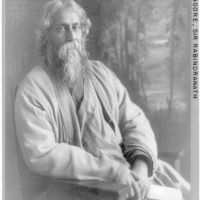Every year on August 7th, India and the world come together to remember and pay homage to one of the most prolific and revered literary figures of all time, Rabindranath Tagore. On this solemn occasion, we commemorate the life, legacy, and enduring impact of a man who not only reshaped literature and arts but also played a pivotal role in shaping the socio-cultural and political landscape of his time. As we observe the death anniversary of Rabindranath Tagore, let us delve into his extraordinary journey, his multifaceted contributions, and the lasting relevance of his ideas.
Early Life and Education
Rabindranath Tagore, born on May 7, 1861, in Calcutta (now Kolkata), India, was destined to become a trailblazer in the world of literature and arts. He was born into a family deeply rooted in culture and intellectual pursuits. His father, Debendranath Tagore, was a prominent Brahmo Samaj leader, and his mother, Sarada Devi, was a poetess and philosopher. This familial environment provided young Tagore with a strong foundation for creativity and intellectual exploration.
Tagore’s early education was unconventional, emphasizing experiential learning and a holistic approach to knowledge. He was a voracious reader and displayed a natural talent for writing from a young age. His early works showed glimpses of the profound insights and poetic sensibilities that would later captivate the world.
The Birth of a Literary Icon
Tagore’s literary journey truly began when he published his first collection of poems, “Kabi Kahini” (The Tale of the Poet), at the tender age of sixteen. The poems in this collection reflected his observations on nature, human emotions, and spirituality. His subsequent works, such as “Bhanusimha Thakurer Padabali” and “Sonnashi,” revealed his deep connection with the rural landscape of Bengal and his empathy for the common man.
In 1913, Tagore’s collection of poems titled “Gitanjali” (Song Offerings) brought him international acclaim. This masterpiece was not only a celebration of human emotions but also a reflection of his spiritual journey. “Gitanjali” marked a significant turning point in his career, earning him the Nobel Prize in Literature – the first non-European to receive this honor. Tagore’s eloquent and evocative verses touched the hearts of readers across continents, fostering a global appreciation for Indian literature.

A Renaissance Man
Tagore’s creativity and intellectual prowess were not confined to poetry alone. He was a true Renaissance man, excelling in various artistic and intellectual disciplines. As a playwright, he wrote timeless dramas such as “Chitra,” “The Post Office,” and “Red Oleanders,” which tackled complex themes like freedom, individuality, and social justice. His plays combined poetic language with profound philosophical insights, leaving a lasting impact on the world of theater.
In addition to his literary achievements, Tagore was a renowned painter, philosopher, musician, and educator. He founded the Vishva Bharati University in Santiniketan, emphasizing a holistic approach to education that blended Western and Eastern knowledge systems. His philosophy of education focused on nurturing creativity, critical thinking, and a harmonious relationship with nature.
Social and Political Visionary
Tagore’s influence extended beyond the realms of literature and arts; he was also a visionary who contributed to the socio-cultural and political discourse of his time. He was a staunch advocate of Indian nationalism and was involved in the Swadeshi Movement against British colonial rule. His scathing critique of the British Raj and his call for self-reliance resonated deeply with the masses, inspiring them to strive for freedom and dignity.
At the same time, Tagore was a proponent of universalism and humanism. He believed in the unity of all cultures and emphasized the need for dialogue and understanding among different civilizations. His visits to various countries, including the United States, Japan, and Europe, allowed him to interact with thinkers and leaders from diverse backgrounds, further shaping his inclusive worldview.
Legacy and Relevance
As we commemorate Rabindranath Tagore on his death anniversary, his legacy remains as vibrant and relevant as ever. His writings continue to inspire generations, transcending geographical and cultural boundaries. Tagore’s exploration of human emotions, his deep connection with nature, and his philosophical insights into life’s complexities continue to resonate with readers worldwide.
In an increasingly interconnected world, Tagore’s emphasis on cultural exchange, mutual respect, and universal harmony holds profound significance. His ideas on education, rooted in holistic development and the nurturing of individual potential, offer valuable insights for modern educational systems grappling with the challenges of the 21st century.
On this solemn occasion of Rabindranath Tagore’s death anniversary, we remember not just a literary giant, but a visionary who left an indelible mark on the world. His poetry, plays, and philosophies have left an enduring legacy that continues to shape the course of literature, education, and social discourse. Tagore’s belief in the power of art, his dedication to humanism, and his commitment to fostering a harmonious world make him a beacon of inspiration for generations to come. As we reflect on his life and contributions, let us carry forward his ideals of creativity, compassion, and unity, ensuring that his legacy remains alive in our hearts and actions.

Thank you for the good writeup It in fact was a amusement account it Look advanced to far added agreeable from you However how could we communicate